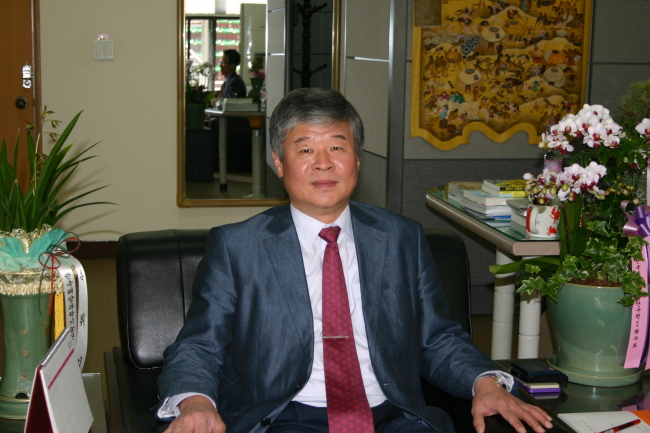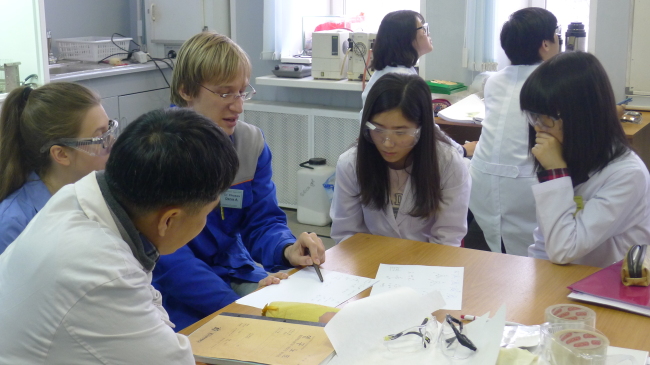Korea Science Academy celebrates 10 years as top science school
By Korea HeraldPublished : April 14, 2013 - 20:00
Chung Yoon, former vice science minister, has been one of the most vocal critics of the nation’s disregard of science and engineering education, warning that an aggravating shortage of professionals in the fields would undermine Korea’s future growth.
After decades of growth based on schemes emulating foreign-born skills, Korea’s catch-up development model is facing its limits and its future should be anchored in creative and innovative research and technologies, he has emphasized.
But the most talented students shun basic sciences and engineering in favor of medicine which promises lucrative jobs.
After some 30 years of public life, Chung, 56, is devoting himself to nurturing talented researchers and engineers as chief of Korea Science Academy, the nation’s top high school for gifted science students.
“Over the last half century, Korea has grown into one of the world’s top 10 powerhouses in various fields based on education and science and technology. The nation should take another leap with new technologies and industries,” Chung said in a written interview with The Korea Herald.
After decades of growth based on schemes emulating foreign-born skills, Korea’s catch-up development model is facing its limits and its future should be anchored in creative and innovative research and technologies, he has emphasized.
But the most talented students shun basic sciences and engineering in favor of medicine which promises lucrative jobs.
After some 30 years of public life, Chung, 56, is devoting himself to nurturing talented researchers and engineers as chief of Korea Science Academy, the nation’s top high school for gifted science students.
“Over the last half century, Korea has grown into one of the world’s top 10 powerhouses in various fields based on education and science and technology. The nation should take another leap with new technologies and industries,” Chung said in a written interview with The Korea Herald.

In March, Chung took office as president of the school in Busan, which marks the 10th anniversary of its foundation as the nation’s first gifted school for science.
“Korea Science Academy will continue with its efforts to produce science talents as the nation’s competitiveness in the future will depend on them and their abilities,” he said.
While many graduates of science high schools go to other majors, mostly medicine, 99.1 percent of KSA students opt for science and engineering, he noted.
Chung served as vice science minister from 2007 to 2008 and headed the state-run Korea Foundation for Advancement & Science and Creativity. He also taught at KAIST, a leading science and engineering university. KSA is affiliated with KAIST.
“Talented children need special education to help hone their gifts. It is just like the British football club Manchester United’s youth team. Through the youth team, Manchester United recruits talent from all over the world and trains them to become the finest players. That is the purpose of KSA,” he said.
Unlike conventional high schools, KSA operates a credit-based system like a university. Therefore, students choose classes based on their interest.

To make sure students develop a balanced academic prowess, they are required to take 73 credits in science subjects and 62 in humanities.
Students have 30 credits to pursue their own academic interests and research.
The school offers research facilities for students to use in their personal research.
Students are also obligated to have 256 hours of student activities during their three years at school. These activities consist of volunteer work, mentoring program and clubs.
The most notable student activities are the Science Academic Festival and Science Adventure Celebration, which are held every spring and fall.
Such activities help students develop independence, teamwork and social skills. Also, students learn how to set their own goals and develop self-discipline required for research.
“This is possible because students do not face the pressure of university entrance. Therefore, students are able to freely explore their interest in science,” Chung said.
Many schools in Korea offer special admission programs for KSA students. Of the 150 students who proceeded to university in 2013, 96 went to KAIST, 27 to Seoul National University, seven to POSTECH and 20 each to Korea and Yonsei University.
The school, though it has only been operating for 10 years, has already produced prodigious graduates who are making headway in distinguished schools such as Princeton University, Stanford University and others.
“I ask the staff to always think, ‘What would help us become the top school? What would help us foster the best talent?’ It’s important that we attain qualitative competitiveness, because our goal is to raise young students who can be successful on a global level.”
By Lee Sang-ju (sjlee370@heraldcorp.com)
-
Articles by Korea Herald


![[Weekender] Geeks have never been so chic in Korea](http://res.heraldm.com/phpwas/restmb_idxmake.php?idx=644&simg=/content/image/2024/05/16/20240516050845_0.jpg&u=)


![[News Focus] Mystery deepens after hundreds of cat deaths in S. Korea](http://res.heraldm.com/phpwas/restmb_idxmake.php?idx=644&simg=/content/image/2024/05/17/20240517050800_0.jpg&u=)

![[KH Explains] Why Korea's so tough on short selling](http://res.heraldm.com/phpwas/restmb_idxmake.php?idx=644&simg=/content/image/2024/05/19/20240519050115_0.jpg&u=20240519162247)
![[Herald Interview] Byun Yo-han's 'unlikable' character is result of calculated acting](http://res.heraldm.com/phpwas/restmb_idxmake.php?idx=644&simg=/content/image/2024/05/16/20240516050855_0.jpg&u=)


![[Photo News] Seoul seeks 'best sleeper'](http://res.heraldm.com/phpwas/restmb_idxmake.php?idx=644&simg=/content/image/2024/05/18/20240518050098_0.jpg&u=)







